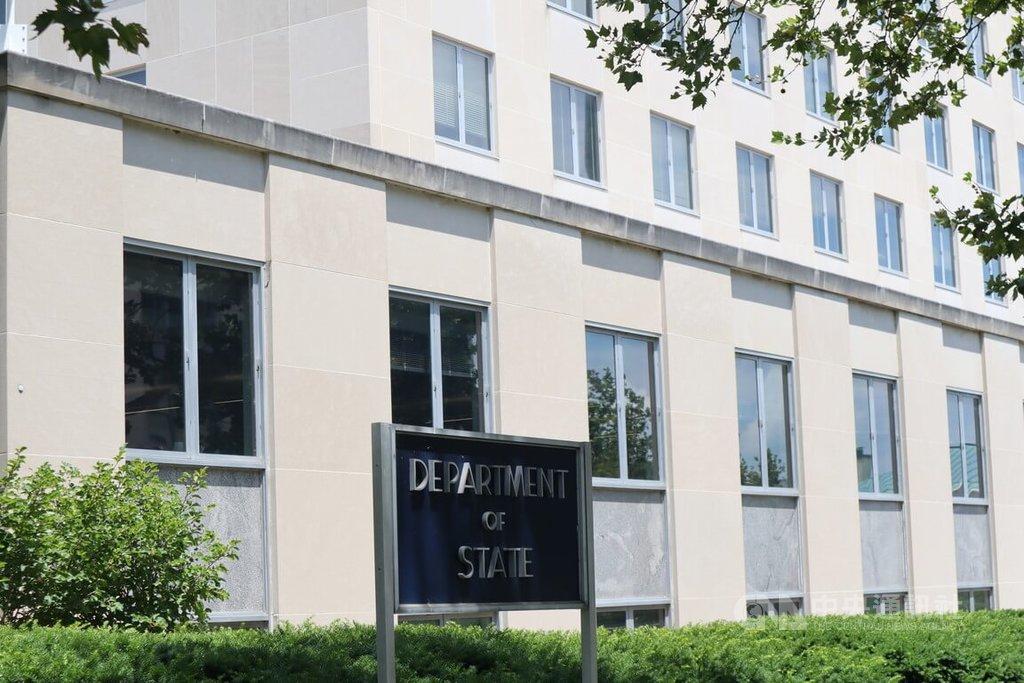The US Department of State has reaffirmed Washington's commitment to the US-Japan alliance and to maintaining stability in the Taiwan Strait following several economic reprisals by Beijing against Tokyo for its support of Taiwan.
US State Department deputy spokesperson Tommy Pigott said in a statement posted on X (formerly known as Twitter) yesterday that the US remains unwavering in its support for Japan's defense, calling the alliance "the cornerstone of peace and security in the Indo-Pacific."
"We firmly oppose any unilateral attempts to change the status quo, including through force or coercion, in the Taiwan Strait, East China Sea or South China Sea," Pigott said.

Photo: CNA
His remarks were the first proactive reaction by the US State Department to China's angry condemnation of Japanese Prime Minister Sanae Takaichi's comment on Nov. 7 that a Chinese attack on Taiwan could constitute "a situation threatening Japan's survival," potentially triggering a military response.
Since then, China has imposed a series of measures aimed at hurting Japan's economy, including advisories against travel and study in the country and the suspension of resuming imports of Japanese seafood.
Over the past week, CNA had twice asked the US State Department for comment, but in both cases it did not mention the US-Japan alliance or Japan's defense.
Instead, it reiterated that the US opposes unilateral attempts to change the status quo, supports cross-strait dialogue and that differences are resolved peacefully in a manner acceptable to people on both sides and free from coercion.
Meanwhile, Takaichi is believed to be the first Japanese leader in decades to publicly suggest that a Taiwan Strait crisis could lead to Japan's military involvement.
Earlier yesterday, President William Lai (賴清德) responded to China’s reported suspension of Japanese seafood imports by sharing photos on social media of himself enjoying miso soup and sushi made with seafood from Kagoshima and Hokkaido.

Taiwan has received more than US$70 million in royalties as of the end of last year from developing the F-16V jet as countries worldwide purchase or upgrade to this popular model, government and military officials said on Saturday. Taiwan funded the development of the F-16V jet and ended up the sole investor as other countries withdrew from the program. Now the F-16V is increasingly popular and countries must pay Taiwan a percentage in royalties when they purchase new F-16V aircraft or upgrade older F-16 models. The next five years are expected to be the peak for these royalties, with Taiwan potentially earning

STAY IN YOUR LANE: As the US and Israel attack Iran, the ministry has warned China not to overstep by including Taiwanese citizens in its evacuation orders The Ministry of Foreign Affairs (MOFA) yesterday rebuked a statement by China’s embassy in Israel that it would evacuate Taiwanese holders of Chinese travel documents from Israel amid the latter’s escalating conflict with Iran. Tensions have risen across the Middle East in the wake of US and Israeli airstrikes on Iran beginning Saturday. China subsequently issued an evacuation notice for its citizens. In a news release, the Chinese embassy in Israel said holders of “Taiwan compatriot permits (台胞證)” issued to Taiwanese nationals by Chinese authorities for travel to China — could register for evacuation to Egypt. In Taipei, the ministry yesterday said Taiwan

‘LIKE-MINDED PARTNER’: Tako van Popta said it would be inappropriate to delay signing the deal with Taiwan because of China, adding he would promote the issue Canadian senators have stressed Taiwan’s importance for international trade and expressed enthusiasm for ensuring the Taiwan-Canada trade cooperation framework agreement is implemented this year. Representative to Canada Harry Tseng (曾厚仁) in an interview with the Central News Agency (CNA) said he was increasingly uneasy about Ottawa’s delays in signing the agreement, especially as Ottawa has warmed toward Beijing. There are “no negotiations left. Not only [is it] initialed, we have three versions of the text ready: English, French and Mandarin,” Tseng said. “That tells you how close we are to the final signature.” Tseng said that he hoped Canadian Prime Minister Mark Carney

POSITIVE DEVELOPMENT: Japan and the US are expected to hold in-depth discussions on Taiwan-related issues during the meeting next month, Japanese sources said The holding of a Japan-US leaders’ meeting ahead of US President Donald Trump’s visit to China is positive news for Taiwan, former Japan-Taiwan Exchange Association representative Hiroyasu Izumi said yesterday. After the Liberal Democratic Party’s landslide victory in Japan’s House of Representatives election, Japanese Prime Minister Sanae Takaichi is scheduled to visit the US next month, where she is to meet with Trump ahead of the US president’s planned visit to China from March 31 to April 2 for a meeting with Chinese President Xi Jinping (習近平). Japan and the US are expected to hold in-depth discussions on Taiwan-related issues during the